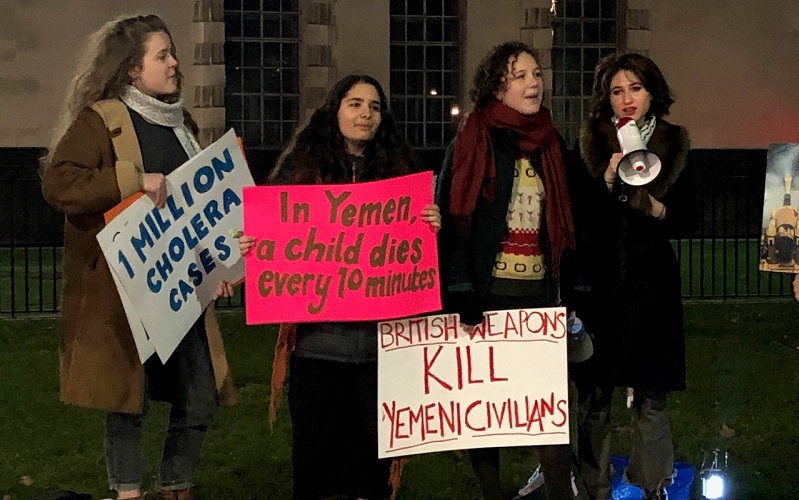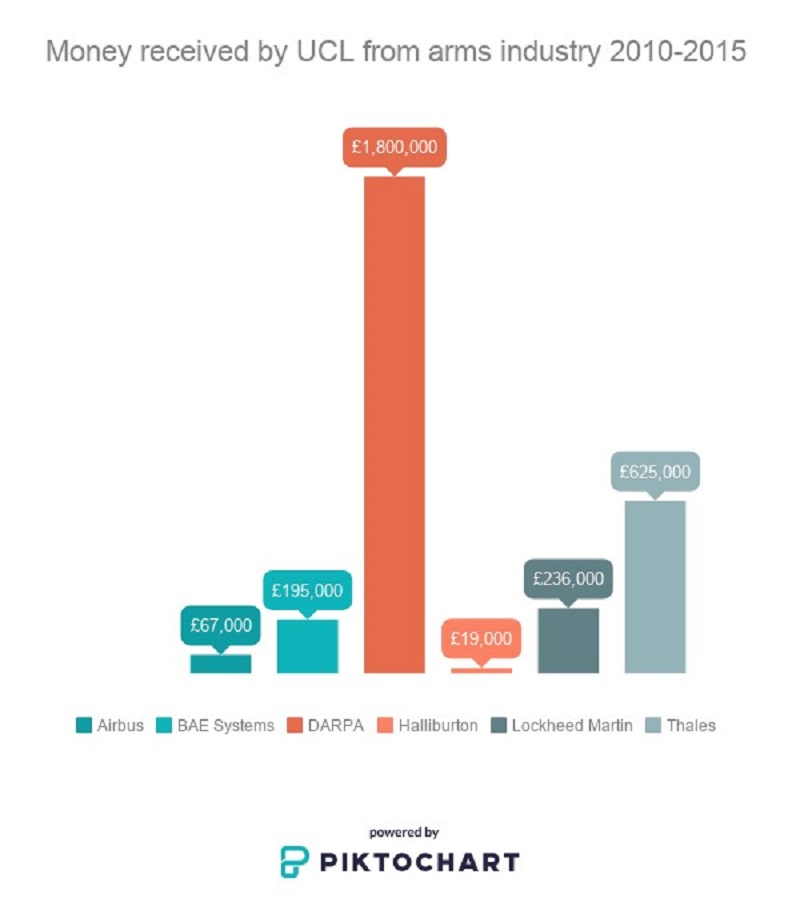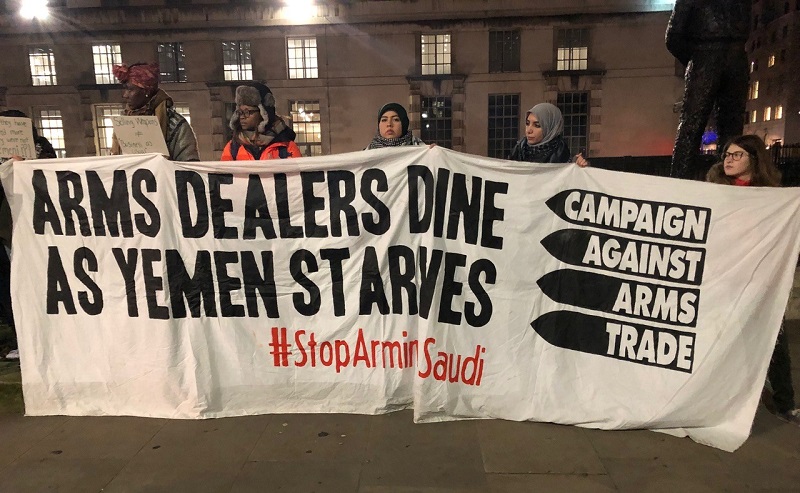Cries to ‘stop bombing Yemen’ filled Whitehall as a protest organised by London Students for Yemen (LSfY) called for the end of arms sales to Saudi Arabia last Thursday.
LSfY, founded in late November by three UCL students, handed out placards claiming the crisis was ‘Britain’s war’, and were joined by members of the Campaign Against Arms Trade (CAAT), the Peace Pledge Union and the Stop the War Coalition.
The founder of London Students for Yemen, who didn’t want to be named, said: “We want to call for an end to the UK’s involvement in Saudi Arabia.

ANGRY: Protestors gathered on Whitehall to demonstrate against UK involvement in Saudi Arabia
“British weapons have been used on Yemeni civilians; the Saudi-led coalition has targeted hospitals, weddings and funerals.”
The undergraduate student at UCL added this was an issue for students as BAE Systems and other defence contractors ‘finance a lot of university departments’.
BAE Systems sell Typhoon and Tornado fighter jets to Saudi Arabia, and according to the CAAT the UK government has confirmed the jets are used in operations over Yemen.
Meanwhile the arms company are one of the main sponsors for the Centre for Ethics and Law at UCL.

A civil war broke out in Yemen in late 2014, pitting the Houthi rebels against the internationally-recognised Yemeni government.
The Yemeni government is now part of a coalition led by Saudi Arabia, to whom the UK has licensed at least £4.7bn of arms exports since the start of the war.
A UCL spokesperson said: “BAE Systems provides annual funding of £10,000, with others, to sponsor the Centre for Ethics and Law, which is an independent research centre.
“The centre’s research is independent and completely uninfluenced by the sponsorship it receives.”
A BAE Systems spokesperson said the company complies with government-to-government agreements between the United Kingdom and the Kingdom of Saudi Arabia, and fulfills its obligations to meet the UK government’s export licenses of arms, which are decided by the Department for International Trade.
A high court ruling in July 2017 dismissed a case brought by the CAAT that UK arms sales be halted over humanitarian concerns, deeming such sales did not break international humanitarian law.
The Department for International Trade declined to comment.

COALITION: Many campaigns united for the protest.
Elliott Murph, a linguistics student, who is finalising a book called Arms in Academia, said: “It’s legal to sell arms, but also completely immoral.”
Mr Murphy issued an FOI request in 2016, which found that UK arms companies gave UCL £3.6m between 2010 and 2015, including £195,000 from BAE Systems.
Mr Murphy was part of the Disarm UCL campaign, which led to UCL’s divestment from arms companies in 2009 following a two-year student campaign, but said that the university still receives money from the industry for ‘research and consultancy’.
The BAE Systems spokesperson said: “BAE Systems has provided sponsorship to the UCL Centre for Ethics and Law for a number of years in order to support its aims of bringing academia, professionals, civil servants and business together to discuss and consider professional ethics and the ethics of risk.”
Co-ordinator of the Peace Pledge Union Symon Hill said: “It’s not just the British government selling weapons, but the British Armed Forces are training Saudi pilots in Anglesey, who are then targeting hospitals and mosques in Yemen.”
He said the government has an arrangement whereby Saudi pilots are trained to use Typhoons and Tornado, as well as Hawk, fighter jets by the RAF.
The UK government confirmed in October this year that 102 pilots were trained over the last decade in this way.
SOAS student Sarah Kassim, who is from Yemen, said she wished the USA and UK were not involved in her country, and that they ‘push for safety’ instead.
She said: “We are having to send money back because nothing is getting to my family [in Aden].
“We have heard of people who are trying to boil rice, and they use the rice water instead of milk because the mothers cannot provide it themselves.”
The UK government has funded more than £570m to Yemen since the conflict began, but Miss Kassim said that aid such as food and medicines does not reach everyone due to road blocks and other impediments.
UCL student and co-founder of London Students for Yemen Marie Detjen said the group was started following criticisms of Saudi Arabia following the state’s alleged involvement in the murder of Jamal Khashoggi.
She said: “We wanted to have a campaign that puts the plight of the Yemeni people in the spotlight.
“This is the first event. Next time we want to hold panel discussions and events.”
